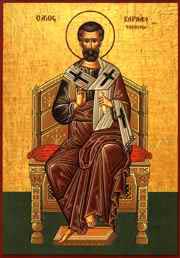Jericho
So the people shouted, and priests blew the trumpets; and when the people heard the sound of the trumpet, the people shouted with a great shout and the wall fell down flat, so that the people went up into the city, every man straight ahead, and they took the city. They utterly destroyed everything in the city, both man and woman, young and old, and ox and sheep and donkey, with the edge of the sword. Joshua said to the two men who had spied out the land, “Go into the harlot’s house and bring the woman and all she has out of there, as you have sworn to her.” So the young men who were spies went in and brought out Rahab and her father and her mother and her brothers and all she had; they also brought out all her relatives and placed them outside the camp of Israel. They burned the city with fire, and all that was in it. Only the silver and gold, and articles of bronze and iron, they put into the treasury of the house of the LORD. However, Rahab the harlot and her father’s household and all she had, Joshua spared; and she has lived in the midst of Israel to this day, for she hid the messengers whom Joshua sent to spy out Jericho.
- Joshua 6:20-24
Today is the Feast of Saint Barnabas, Apostle, Martyr, and all around good guy. In the Office for his feast day, I read a familiar passage of the Book of Joshua that details the conquest of the city of Jericho. On the one hand, it’s a story that’s very much in the style of Joshua; Israel swoops in and with the assistance of God and lead by the arc of the covenant, succeeds in battle and takes the land. On the other hand, this particular passage also serves a great purpose in the metaphor of both conversion and Armageddon.

The conversion metaphor was most interesting to me as I spent time with the reading. After-all, it has the most direct relationship to my own life. You see, the first thing the Israelites did when they approached Jericho was to send in spies. These men found their way to Rahab’s home, as it was connected to the outer walls of the city and gave them access inside. When the guards came around looking for them, Rahab hid them and misled the guards. She knew what was coming and chose to help the Israelites in exchange for her life and her family’s. In this way, she acted like the spark of grace inside each of us which opens our back door and allows the Holy Spirit to sneak inside (One might say, “Like a thief in the night”).
The seeds were planted, then, and the conquest was only a matter of time. When Joshua was instructed by the captain of the Lord’s host as to how to attack, it wasn’t by storming the walls or starving them out by a siege. After seven days of marching his men around the city, blowing their rams horns (Another reference to the trumpets of Revelation to come?), his men let out a yell. At the sound, the walls of Jericho fell and every creature inside was killed. Only Rahab and her relatives were spared. This part more than any other fits my personal experience.
For years I’d closed myself off to Christianity and sought answers anywhere else. Through all that time, though, the Spirit was at work inside me, preparing for the day. When it finally came, it was with trumpet blares and screaming, at least in metaphor. In an instant all my walls against faith were gone, crumbled to dust, and in a wave I watched as all those useless, misguided thoughts and searching were destroyed. All that was left was that single spark of faith that couldn’t be doused. Suddenly, my faith was alone in me and there was no denying it. Catholicism set the old me ablaze and a new nation was formed.
I think it’s for this reason that the reading was chosen for Barnabas' feast. He was, after all, a great missionary and along with St. Paul, was probably most responsible for bringing Christianity to the gentiles. St. Luke, normally quiet on his personal opinions of others, said of Barnabas “he was a good man, full of the Holy Ghost and of Faith”. That “good” quality, his immutable accepting of people and hope for their inclusion in the faith led him to not only sponsor Saul of Tarsis (St. Paul) into the Church when others were wary of him for how intensely he had persecuted them previously, but also to defend and include his cousin John Mark (later the Evangelist) when Paul would accuse him of desertion.
The story of Jericho is certainly an interesting reading, and there’s so much more that could be said about it. That’s the way of scripture, though.